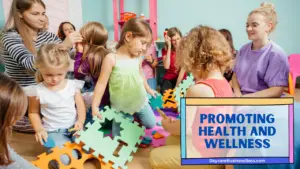Education has moved beyond the traditional classroom environment in an age of fast technology innovation. Childcare education is one sector that has benefited immensely from this evolution. The availability of daycare courses online has become a transforming force as the need for skilled and proficient childcare personnel continues to climb. These online courses serve as a springboard for ambitious childcare workers to thrive in their roles and make a positive difference in the lives of the children they care for.
To build a strong foundation in childcare, you should start with online courses covering child development, safety, curriculum planning, health, and communication. These courses give prospective childcare professionals essential skills and expertise to provide exceptional care to children.
In this article, we will explore the relevance, benefits, and variety of daycare classes available through online platforms. Whether you’re a seasoned childcare professional looking to improve your abilities or an individual starting a new career, the world of online daycare courses promises a plethora of insights and opportunities for progress.
Child Development: Nurturing Growth and Learning

A thorough understanding of child development is at the heart of competent childcare. This information serves as the foundation for caregivers to provide nurturing and effective support to the children in their care. Online courses have evolved as a powerful platform for conveying complete insights into the delicate area of child development in the current day.
These online child development courses take you on a trip through the many facets of a kid’s development, from the fragile stages of infancy to the turbulent years of adolescence. A comprehensive grasp of physical, cognitive, emotional, and social milestones serves as a guiding light for caregivers, illuminating the route to giving the best possible care and nourishing an environment.
The mechanics behind how infants learn, interact, and react to their surroundings are one of the key aspects exposed by these courses. Caregivers get crucial insights for adapting their approach to each child’s specific needs by examining these cognitive and behavioral processes. Caregivers who understand the subtleties of development can provide experiences that are not only enriching but also fit with a child’s developmental stage.
The importance of understanding distinct developmental stages cannot be overstated. It enables childcare staff to provide tailored attention that meets the changing needs of children. This versatility guarantees that treatment is fine-tuned to a child’s developing talents and rising curiosity. Caregivers who become aware of the delicate interplay between physical maturation, cognitive expansion, emotional maturation, and social integration can create an atmosphere that fosters all of these aspects in harmony.
The consequences of this understanding go far beyond simple caregiving. Developmentally informed childcare provides children with the foundation they need to flourish in an ever-changing world. These formative experiences lay the groundwork for improved problem-solving ability, emotional intelligence, and communication skills.
In today’s world, when online education is gradually redefining traditional learning paradigms, the availability of child development courses is a blessing. Professionals in the childcare field, whether parents or teachers, can work through these resources at their own pace, allowing them to integrate newfound knowledge with practical application.
Read more about: The Online Advantage in Childcare: Insights from Online Learning
Safety First: Ensuring Well-Being
Nothing is more important in childcare than the safety of the children entrusted to a caregiver’s care. The importance of this component cannot be emphasized, and it is in this context that online safety practice courses emerge as vital instruments. These courses are meant to provide childcare professionals with a thorough grasp of safety precautions, allowing them to create surroundings that are both nurturing and secure.
Child safety involves a wide range of factors, from preventing accidents and injuries to dealing with situations. Online safety courses provide an in-depth examination of these aspects, arming parents with knowledge ranging from physical space childproofing to the precise execution of emergency protocols. These courses provide a well-rounded education by diving into these details, empowering caregivers to be watchful guardians of the children’s well-being.
One of the most important aspects of these courses is their ability to identify potential hazards and offer practical preventative measures. This proactive strategy, based on knowledge and awareness, has the potential to dramatically lower the likelihood of an accident. Caregivers obtain insights that help them change their settings into safe havens for children to explore and learn without additional dangers, whether it’s recognizing choking hazards or constructing a safe play area.
Online safety training goes beyond the physical sphere, addressing issues such as cleanliness and health. Caregivers contribute to the overall health and wellness of children by creating an understanding of good hygiene habits. These courses encourage behaviors that form the foundation for a healthy lifestyle, from teaching children the value of handwashing to maintaining a clean environment.
The knowledge gained from online safety courses serves as an important safeguard for the entire development of children. It enables caregivers to see beyond the obvious, proactively identifying possible hazards and working tirelessly to mitigate them. This proactive approach not only prevents injury but also fosters trust and confidence among parents and guardians who commit their children to the caregiver’s care.
These online courses provide a flexible and accessible channel for education as the digital landscape affects the way we study. Professionals in the childcare industry can use these materials whenever it is convenient for them, tailoring their learning to their schedules. This ease of access, along with the practicality of the knowledge obtained, enables caregivers to establish environments that prioritize the safety and well-being of the children they care for.
Curriculum Planning: Igniting Young Minds
The ability to create an interesting and instructional curriculum is a distinguishing feature of excellent childcare professionals. Online curriculum planning courses emerge as useful resources in this environment, providing childcare workers with a comprehensive arsenal for designing activities that engage young minds while supporting holistic development.
These online courses dig into the art and science of curriculum planning, revealing ways that help caregivers plan age-appropriate activities. The primary goal is to arouse children’s interest and quest for knowledge. Caregivers develop a profound understanding of how to create an environment that smoothly integrates fun and education by digging into the complexities of these courses.
The ability to customize activities to a child’s developmental stage is key to this curriculum preparation. These courses provide caregivers with knowledge of the cognitive, physical, and social milestones that children experience. Armed with this knowledge, caregivers may design activities that not only match a child’s ability but also foster growth in all of these areas. Caregivers learn to be architects of experiences that support well-rounded development, whether it’s developing puzzles that engage critical thinking or organizing group games that foster teamwork.
These courses go beyond simply carrying out exercises to reveal the principles of good curriculum design. This includes the art of sequencing, which ensures that activities flow naturally and progressively while building on previously learned skills. Caregivers also learn how to include elements of creativity and inquiry into learning, fostering children’s natural curiosity. As a result, the curriculum moves beyond rote learning and becomes a dynamic tapestry in which children actively connect with topics, cultivating a genuine love of learning.
The repercussions of mastering curriculum planning go far beyond the realm of childcare. Children who are exposed to well-designed curricula from an early age are better prepared to face scholastic problems later in life. They foster critical abilities such as problem-solving, communication, and cooperation, all of which are necessary for navigating an increasingly complicated environment.
Curriculum planning courses are particularly accessible in the present era when online education is disrupting traditional learning paradigms. Caregivers can easily incorporate their learning into their schedules by taking advantage of the flexibility that online platforms provide. This strategy ensures that new ideas are implemented practically and sustainably.
Promoting Health and Wellness

A cornerstone of responsible caregiving is the symbiotic relationship between children’s health and overall development. In this environment, online health-related courses emerge as vital resources, providing childcare professionals with a solid framework for ensuring children’s well-being. These courses educate caregivers to take a proactive position in nurturing healthy young lives by delving into themes such as nutrition, hygiene, health checks, and common children’s ailments.
These online courses act as compasses, leading caregivers through the complexities of caring for children’s health. These courses, at their heart, lay the groundwork for understanding the subtleties of nutrition. Caregivers are educated on the necessity of a well-balanced diet, as well as how to create menus that meet the changing requirements of children. With this knowledge, they can ensure that children get the nutrients they need for healthy growth and development.
Another important topic addressed in these classes is hygiene. Caregivers develop an understanding of the need of teaching children good hygiene practices. These courses stress the role of cleanliness in preventing the spread of infections and establishing a strong foundation for good health, from handwashing habits to maintaining a clean environment.
These sessions cover health tests and frequent childhood ailments. Caregivers learn to recognize potential health issues and symptoms that require medical attention. This expertise enables them to treat any health issues as soon as they arise, ensuring that children receive timely care and assistance.
Beyond the obvious benefits, concentrating on children’s health has far-reaching consequences. The habits and behaviors ingrained in children lay the framework for lifetime happiness. Online health courses provide caregivers with the tools they need to instill healthy habits in their children, laying the groundwork for long-term health and vitality. Nutrition, cleanliness, and illness prevention lessons become guiding values that children can carry into adolescence and life.
The availability of online courses in the sphere of modern education gives a flexible and easy platform for learning. Caregivers can work through the content at their own pace, incorporating new insights into their childcare methods as they go. This ease of access multiplies the impact of newly acquired knowledge, encouraging a circle of ongoing improvement in caregiving methods.
Read more about: Senior Wellness Ventures: Steps to Develop an Adult Daycare Business Plan
Effective Communication: Bridging Connections
In the field of childcare, communication is the foundation upon which good relationships and thriving settings are established. Online courses designed to improve communication skills stand out as vital resources in this digital age, providing childcare professionals with the tools they need to engage effectively with both children and parents. These courses cover a wide range of abilities, from active listening to conflict resolution, and provide solutions for building relationships and overcoming obstacles.
The importance of attentive listening is central to these courses. Caregivers learn the intricacies of actually hearing and understanding what their children are saying, whether via words, gestures, or feelings. This talent not only allows caregivers to respond empathetically but also builds a sense of validation and trust in the children under their care.
Another important aspect covered in these courses is conflict resolution. Caregivers learn skills for navigating arguments or challenges between youngsters. Caregivers who learn the art of constructive conflict resolution can foster a harmonious and respectful environment that fosters beneficial interactions among youngsters.
Communication in childcare, however, extends beyond interactions with children. These courses also teach childcare staff how to properly communicate with parents. Transparent and compassionate communication with parents is essential for building trust and providing a seamless relationship in the child’s developmental journey. Caregivers learn insights into communicating their children’s progress, discussing both achievements and challenges. This open line of communication makes parents feel more engaged in their child’s experiences in the daycare setting, encouraging a sense of partnership in influencing the child’s development.
Mastering communication skills has ramifications throughout the childcare environment. Effective communication not only fosters a healthy environment in which children may thrive, but it also prepares the path for a better understanding between caregivers and parents. When both partners openly communicate their observations and concerns, they can work together to establish an environment that best meets the child’s specific needs.
Online courses provide a flexible and accessible platform for professional development in today’s digital landscape. Caregivers can interact with the material at their leisure, easily incorporating new communication skills into existing practices. This strategy not only increases their effectiveness but also broadens the experiences of the youngsters in their care.
Frequently Asked Questions

Why are online courses necessary for laying a solid foundation in childcare?
Online courses offer a flexible and convenient method to obtain vital childcare skills and knowledge. Child development, safety, curriculum planning, health, and communication are just a few of the themes covered in these courses. Aspiring childcare providers can learn at their speed while still balancing their previous responsibilities by enrolling in online courses. These courses educate caregivers with the knowledge and skills necessary to provide great care to children, promoting their growth, learning, and general well-being.
How do online courses meet the unique requirements of childcare professionals?
By providing a variety of instructional approaches, online courses meet the different demands of childcare providers. Interactive movies, quizzes, conversations, and peer exchanges are examples of these strategies. Such approaches cater to varied learning styles and build a sense of community among students from various backgrounds. Child development and safety protocols, as well as curriculum planning and effective communication, are all covered in the courses. This complete education equips caregivers to provide children in their care with secure, nurturing, and educational surroundings.
Can online courses aid people who already work in childcare?
Absolutely. Individuals already working in childcare who want to improve their skills or specialize in specific areas might take advantage of online courses. Professionals can continue their education while managing their employment responsibilities thanks to the flexibility of online learning. Experienced caregivers can increase their skills and provide better care to the children they serve by taking courses on child development, safety guidelines, curriculum design, health promotion, and communication tactics.
To learn more on how to start your own daycare checkout my startup documents here.
The information provided by DaycareBusinessBoss.com (“The Site”) is for general informational purposes only. All information on the Site is provided in good faith, however, we make no representation or warranty of any kind, express or implied, regarding the accuracy, adequacy, validity, reliability, availability or completeness of any information on the Site. Under no circumstance shall we have any liability to you for any loss or damage of any kind incurred as a result of the use of the Site or Reliance on any information provided on the Site. Your use of the Site and your reliance on any information on the Site is solely at your own risk.
This blog post is for educational purposes only and does not constitute legal advice. Please consult a legal expert to address your specific needs. Terms and Conditions. (https://daycarebusinessboss.com/terms-conditions/)

Meet Shawn Chun: Entrepreneur and Childcare Business Fan.
I’m a happy individual who happens to be an entrepreneur. I have owned several types of businesses in my life from a coffee shop to an import and export business to an online review business plus a few more and now I create online daycare business resources for those interested in starting new ventures. It’s demanding work but I love it. I do it for those passionate about their business and their goals. That’s why when I meet a childcare business owner, I see myself. I know how hard the struggle is to retain clients, find good employees and keep the business growing all while trying to stay competitive.
That’s why I created Daycare Business Boss: I want to help childcare business owners like you build a thriving business that brings you endless joy and supports your ideal lifestyle.


